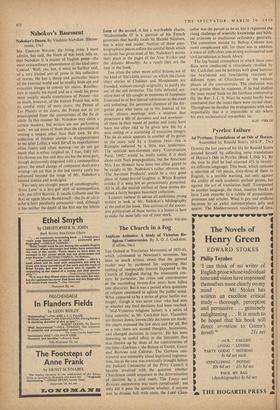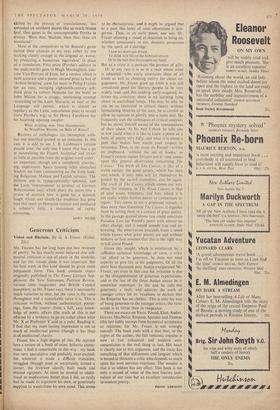Pyrrhic Failure
DURING the last years of his life Sir Ronald Storrs amused himself by collecting verse translations of Horace's Ode to Pyrrha (Book 1. Ode V). By the time he died he had amassed 451 in twenty- six different languages. This book, which contains a selection of 144 pieces, sixty-three of them in English, is a terrible warning, not only against the aridity of such academic parlour games, but against the act of translation itself. Transported to another language, the clean, massive blocks of lyric Latin crumble to a rubble of prepositions, pronouns and articles. What is gay and artificial becomes by an awful metamorphosis jolly and quaint. The Mediterranean vocabulary of love, chilled by the process of 'translationese,' lies unloaded on northern shores like so much frozen beef. One gazes at the unrecognisable Pyrrha in dismay. 'Bless thee, Madam, bless thee, thou art translated I Most of the competitors in Sir Ronald's game ruined their chances in my eyes eithcr by not sticking closely enough to the original or, worse, by producing a humorous 'equivalent' in place of a translation. First prize (Pyrrha's address in the underworld) goes to Hugh Macnaghten, one- time Vice-Provost of Eton, for a version which is both accurate and a poem; second prize (a box of 'Ardent Stripling' scent for men) to Philip Francis for an easy, swinging eighteenth-century job; third prize (a rubber Neptune for the bath) to John Milton for a craggy, unrhyming attempt 'according td the Latin Measure, as near as the Language will permit,' which is almost as lapidary as the Latin; consolation prize (a strand from Pyrrha's wig) to Sir Henry Fanshawe for his haunting opening couplet :
What stripling now Thee discomposes, In Woodbine Rooms, on Beds of Roses?
Reviews of anthologies are incomplete with- out one horrified protest at an omission. In this case it is odd to see J. B. Leishman's version passed over,' the only one I know that has a go at naturalising the Fourth Asclepiad and Strays as little as possible from the original word order : an important, though not a completely convinc- ing, experiment. Space (among other obstacles) hinders me from commenting on the lively-look- ing Bulgarian, Maltese and Lettish versions. The Hebrew one is, typographically, splendid, and the Latin 'improvement' (a product of German Reformation zeal) whieh alters the poem into a praise of married love is good for a donnish laugh. Great and sleuth-like erudition has gone into this most un-Horatian venture and produced a scholar's folly, a monument of in fc,lix
JAMES Miciini



































 Previous page
Previous page